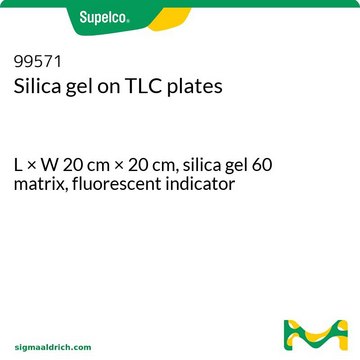Z193291
Sigma-Aldrich® TLC Plates
silica gel matrix, L × W 20 cm × 20 cm
Sign Into View Organizational & Contract Pricing
All Photos(1)
About This Item
UNSPSC Code:
41115711
eCl@ss:
32110504
Recommended Products
material
aluminum support
silica gel matrix
feature
binder Polymeric
fluorescent indicator
packaging
pkg of 25 ea
manufacturer/tradename
Sigma-Aldrich
technique(s)
thin layer chromatography (TLC): suitable
L × W
20 cm × 20 cm
layer thickness
200 μm
particle size
25 μm
Looking for similar products? Visit Product Comparison Guide
General description
Thin-layer chromatography (TLC) plates for adsorption, partition, and ion-exchange techniques. Six media choices with glass, polyester, and aluminum backings. Silica-based adsorbent layers in Sigma-Aldrich TLC plates incorporate a polymeric binder; highly purified silica gel plates incorporate a gypsum/polymer binder.
- Silica gel - for weakly to strongly polar separations, pore size 60 Å
- High purity silica gel - acid washed for separation of aflatoxins
- Cellulose - for partition chromatography, (SigmaCell Type 100 Cellulose)
- Cellulose PEI - for separation of weak anions (amino acids, peptides) PEI plates may turn slightly yellow, affecting separation. Pre-develop plates in distilled water to minimize yellow color.
- Chiral silica - for separation of optically active isomers by ligand exchange, pore size 60Å
Application
- Eco-friendly oil-water separation using bio-Zn oxide-based superhydrophobic membrane: Discusses the development of an environmentally friendly method for oil-water separation using zinc oxide, showcasing its application in water treatment technologies and highlighting its sustainable aspects (Beagan et al., 2024).
- Enhancement of lettuce growth and reduction of chromium uptake: Studies the combined application of zinc oxide and iron nanoparticles to improve plant growth and reduce heavy metal uptake in contaminated soils, emphasizing its significance in environmental and agricultural sciences (Sameer et al., 2024).
- Surface modification of metal oxides for nanoparticle stability and toxicity reduction: Investigates the effects of surface modifications of zinc oxide on the stability and potential toxicity of nanoparticles, providing insights into safer nanoparticle applications in biotechnology and materials science (Monem et al., 2024).
- Development of advanced materials for gas sensing: Examines the application of defect engineering in zinc oxide nanorods to enhance methane gas sensing capabilities, demonstrating the material′s potential in developing sophisticated sensors for environmental monitoring (Li et al., 2024).
Legal Information
SIGMA-ALDRICH is a registered trademark of Merck KGaA, Darmstadt, Germany
Choose from one of the most recent versions:
Certificates of Analysis (COA)
Lot/Batch Number
Sorry, we don't have COAs for this product available online at this time.
If you need assistance, please contact Customer Support.
Already Own This Product?
Find documentation for the products that you have recently purchased in the Document Library.
Our team of scientists has experience in all areas of research including Life Science, Material Science, Chemical Synthesis, Chromatography, Analytical and many others.
Contact Technical Service